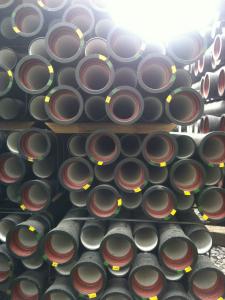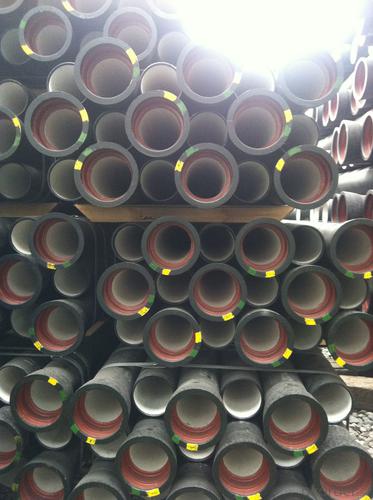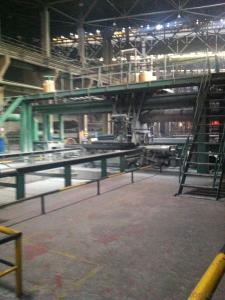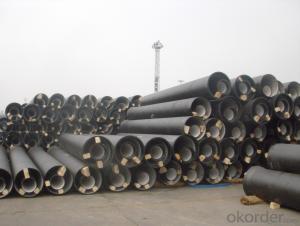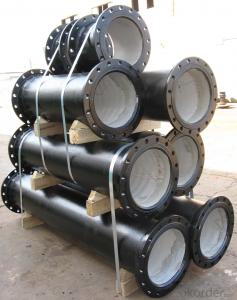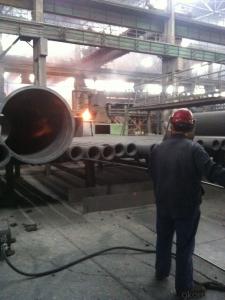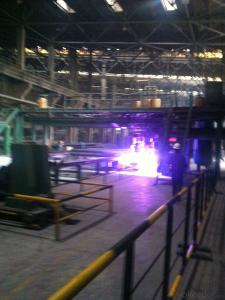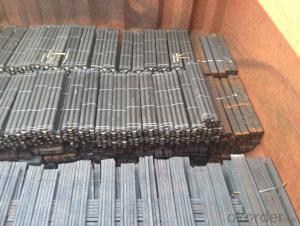DUCTILE IRON PIPE AND PIPE FITTINGS K8CLASS DN500
- Loading Port:
- Tianjin
- Payment Terms:
- TT OR LC
- Min Order Qty:
- 23 pc
- Supply Capability:
- 3000 pc/month
OKorder Service Pledge
OKorder Financial Service
You Might Also Like
Material : Ductile Cast Iron
Size Range : DN 80mm to DN 2000mm
Unit Effective Length : 6m or 5.7m
Manufacture Standard: ISO 2531:1998/ EN 545:2006/EN 598:2007
Annual capacity : 200,000 tons
Coating Exterior: Zinc 130g/m2 according to ISO 8179-1 and bitumen coating 70 microns.
Cement Interior: Portland Cement/ High Alumina Cement/ Sulphate Resisting Cement Lining according to ISO 4179
Special requirements on external coating and internal lining can be applied
We also provide accessories such as SBR/EPDM rubber gaskets, lubricant paste, pipe caps, PE sleeves, etc.
Additional Parts:
Each pipe is strictly inspected according to related standard to ensure permanently high performance.
Easy Installation at site and service free for life
Long Service Lifespan
Quotation will arrive you within 24hours once we get your inquiry.
We guarantee offering you a competitive price.
A copy of original inspection reports of pipes will be offered after shipment.
Photos of loading process will be sent to the customer after shipment effect.
We will follow-up the delivery progress after shipment effect and update to the customer on weekly basis.
- Q: What is the exterior anticorrosion of nodular cast iron pipes?
- According to the national standard GB/T13295-2008, external corrosion prevention technology of ductile cast iron pipe is coated with asphalt paint, spraying zinc, widely used in domestic manufacturers is spraying zinc spraying asphalt layers corrosion, zinc layer thickness: 130 grams / square meters, the thickness of asphalt 75Um.
- Q: What is the expected joint flexibility of ductile iron pipes?
- Due to the inherent material properties of ductile iron pipes, their expected joint flexibility is typically high. Ductile iron is renowned for its exceptional ductility, which enables it to deform without fracturing. This quality empowers ductile iron pipes to withstand external loads, ground movement, and pressure fluctuations without significant damage. To accommodate movement, the joints in ductile iron pipes are usually designed to provide additional flexibility. The most commonly used joint type in ductile iron pipes is the push-on joint. This joint type permits angular deflection and axial movement. It consists of a rubber gasket that creates a watertight seal and allows for slight movement between pipe sections. The expected joint flexibility varies depending on several factors, such as pipe diameter, joint type, and installation methods. Generally, ductile iron pipes can accommodate angular deflection within a certain range, typically ranging from 5 to 10 degrees, depending on the joint design. Axial movement can also be accommodated to some extent, allowing for the expansion and contraction of the pipe system. It is important to note that the specific manufacturer and product specifications may affect joint flexibility. Therefore, it is recommended to consult the manufacturer's guidelines and specifications to determine the expected joint flexibility of a particular ductile iron pipe product.
- Q: Can ductile iron pipe be used for irrigation pumping stations?
- Indeed, irrigation pumping stations can utilize ductile iron pipe. This type of pipe finds widespread application, particularly in irrigation systems, owing to its robustness and resilience. Its exceptional tensile strength enables it to endure substantial pressure and weight, rendering it highly suitable for irrigation pumping stations. Furthermore, ductile iron pipe exhibits resistance to corrosion, a desirable trait in the presence of water within irrigation systems. Moreover, its ease of installation and maintenance make it an economical selection for irrigation projects.
- Q: Do ductile iron pipes require internal linings or coatings?
- Yes, ductile iron pipes typically require internal linings or coatings in order to prevent corrosion and extend their lifespan.
- Q: What are the different sizes of ductile iron pipes available?
- Ductile iron pipes are available in a variety of sizes to cater to different applications and requirements. The sizes of ductile iron pipes typically range from 3 inches to 64 inches in diameter. These different sizes allow for flexibility and adaptability in various industries such as water supply, sewage systems, irrigation, and industrial piping. The smaller diameter ductile iron pipes, such as those in the range of 3 to 12 inches, are commonly used for residential and small-scale applications like household plumbing, fire hydrant systems, and small irrigation projects. These sizes are often found in urban areas and residential neighborhoods. For more extensive applications, larger diameter ductile iron pipes are utilized. They can range from 14 inches up to 64 inches in diameter. These larger pipes are predominantly used in municipal water supply systems, wastewater treatment plants, and industrial facilities where high-volume water flow is required. The availability of a wide range of sizes in ductile iron pipes ensures that they can accommodate various flow rates and pressure requirements. It allows engineers, contractors, and designers to select the appropriate size based on the specific needs of a particular project or application. It is essential to consult industry standards, local regulations, and engineering guidelines to determine the suitable size of ductile iron pipes for any specific project. This ensures that the pipes are capable of meeting the required performance standards and are suitable for the intended use.
- Q: What is the expected maintenance for ductile iron pipes?
- To ensure the longevity and optimal performance of ductile iron pipes, regular inspections and preventative measures are required. The first step is to conduct routine visual inspections to detect any signs of corrosion, leaks, or damage. By examining the external surface for cracks, rust, or discoloration, potential issues can be identified at an early stage. In addition, periodic cleaning of the pipes is necessary to eliminate any debris or sediment build-up that could obstruct the water flow. This can be accomplished by flushing the pipes or utilizing mechanical cleaning techniques. It is also crucial to regularly check and maintain the protective coatings on the pipes, such as linings or external paints, to prevent corrosion and maintain their structural integrity. To extend the lifespan of ductile iron pipes, a comprehensive corrosion control program should be implemented. This may involve applying corrosion inhibitors, utilizing cathodic protection systems, and periodically re-coating the pipes. Regular monitoring of water chemistry parameters, such as pH levels and chlorine content, can further prevent corrosion and prolong the pipes' lifespan. Lastly, maintaining accurate records of maintenance activities, such as inspections, cleaning, and repairs, is essential for tracking the condition of the pipes over time. This enables proactive planning for future maintenance and replacement requirements, ensuring the efficient and reliable functioning of ductile iron pipes.
- Q: If the ductile iron pipe is broken, can we use rush repair?
- PE pipe repair section, as the name suggests, is a kind of used to repair the pipeline accessories. At present, the specifications of the repair section are: Phi 90, Phi 110, Phi 125, Phi 160, Phi 200, Phi 225, Phi 250, Phi 315 these specifications.
- Q: Can ductile iron pipes be used in areas with high soil acidity and alkalinity?
- Areas with high soil acidity and alkalinity generally allow for the use of ductile iron pipes. However, it is crucial to consider the specific conditions and take appropriate measures to minimize the potential impact of these soil characteristics on the pipes. In regions with high soil acidity, the acidic conditions can promote corrosion of metal pipes, including ductile iron. To prevent this, protective measures such as applying an external coating or implementing cathodic protection can be utilized. These measures create a barrier between the pipe and the corrosive environment, thereby extending the pipes' lifespan. Similarly, in areas with high soil alkalinity, the alkaline conditions can affect the performance of ductile iron pipes. Alkaline soils can cause the formation of calcium carbonate deposits, commonly referred to as scale, which can gradually reduce the flow capacity of the pipes. Regular maintenance and cleaning of the pipes can help mitigate the effects of scale accumulation. It is important to note that the suitability of ductile iron pipes in areas with high soil acidity and alkalinity may also depend on the specific grade and quality of the pipes. Manufacturers often provide guidelines and recommendations regarding the use of their products in different environmental conditions. It is advisable to consult with pipe manufacturers or industry experts to ensure the proper selection and installation of ductile iron pipes in such areas.
- Q: What is the expected deflection capability of ductile iron pipes?
- The expected deflection capability of ductile iron pipes is typically around 2-5% of the pipe diameter, allowing them to withstand moderate levels of ground movement or settlement without experiencing significant structural damage.
- Q: Can ductile iron pipes be used for gas distribution networks?
- Yes, ductile iron pipes can be used for gas distribution networks.
Send your message to us
DUCTILE IRON PIPE AND PIPE FITTINGS K8CLASS DN500
- Loading Port:
- Tianjin
- Payment Terms:
- TT OR LC
- Min Order Qty:
- 23 pc
- Supply Capability:
- 3000 pc/month
OKorder Service Pledge
OKorder Financial Service
Similar products
Hot products
Hot Searches
Related keywords
